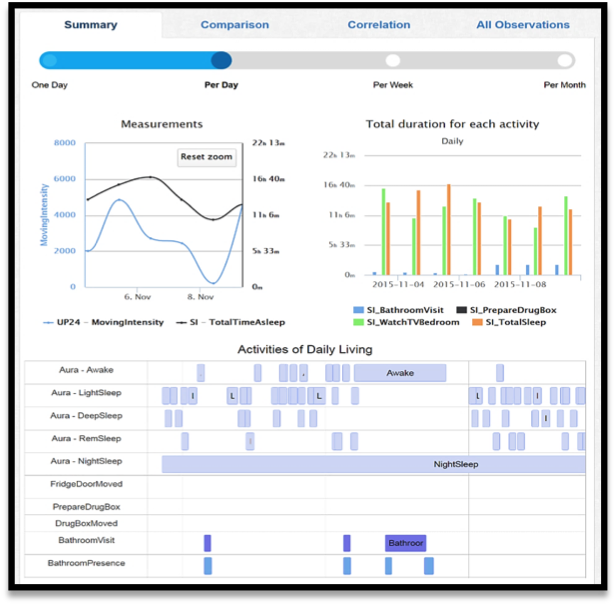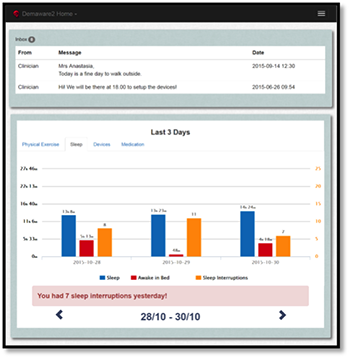1 November 2016

Thessaloniki, Greece – Greek researchers demonstrated the potential use of assistive technologies for people with dementia, to fulfill an important need: the improvement of clinical diagnosis and decision making meeting individual needs. Remote home monitoring of patients is a promising “participant-centered” management approach which provides relevant and reliable information that enables clinicians to drive adaptive interventions. In turn, these personalized interventions further improve the physical and cognitive condition of patients, while still monitoring their daily function. An effective clinical intervention through such a smart system, requires participant self-monitoring (e.g. daily sleep observation) and clinicians keen on empowering patients with mild cognitive impairment (MCI) and Alzheimer’s disease (AD).
So far, a great deal of existing assistive Information and Communication Technology (ICT) approaches for the care of people with Alzheimer’s, have utilized a single or a few devices and focused on specific problematic areas and domains including wandering, falling, sleep quality o r daily tasks. However, scientists from Centre for Research and Technology Hellas/Information Technologies Institute (CERTH/ITI), the Aristotle University of Thessaloniki (AUTH) and the Greek Association of Alzheimer’s Disease and Related Disorders (GAADRD) developed a system, which systematically combines information coming from several types of sensors, which are used for recognizing moving intensity, sleep patterns and presence in specific home areas. After collecting this diverse information, the system performs reasoning in order to interpret and combine them into high-level daily activities and problems related to the disease. This holistic monitoring of all areas of interest, is presented in tailored visualizations either in daily basis to detect patterns and progress in time or in-depth to pinpoint problems and causes. Applications for both clinicians/caregivers and participants, providing technology-aided, personalized non-pharmaceutical interventions, enhancing weekly clinical visits while maintaining human clinician-participant contact.
r daily tasks. However, scientists from Centre for Research and Technology Hellas/Information Technologies Institute (CERTH/ITI), the Aristotle University of Thessaloniki (AUTH) and the Greek Association of Alzheimer’s Disease and Related Disorders (GAADRD) developed a system, which systematically combines information coming from several types of sensors, which are used for recognizing moving intensity, sleep patterns and presence in specific home areas. After collecting this diverse information, the system performs reasoning in order to interpret and combine them into high-level daily activities and problems related to the disease. This holistic monitoring of all areas of interest, is presented in tailored visualizations either in daily basis to detect patterns and progress in time or in-depth to pinpoint problems and causes. Applications for both clinicians/caregivers and participants, providing technology-aided, personalized non-pharmaceutical interventions, enhancing weekly clinical visits while maintaining human clinician-participant contact.
The deployment of the proposed system in four different homes of people with mild cognitive impairment and Alzheimer’s disease was the main purpose of this research. The main target was to have complete data collection from all homes, to introduce clinical non-pharmacological interventions, to enhance the participants’ quality of life and improve their cognitive functions and functionality, based on clinical assessment after a 4-months trial. In general, our research focused on high priority requirements for the home environment including the user interface for the clinician as well as the participants and their caregivers, in a simple enough, accessible and encouraging way to promote a feeling of safety and inclusion.
As found in this study, the proposed system is able to provide all the necessary tools to the clinicians in order to efficiently support them and promote quality of life improvement via assistive technology. The adapted and personalized interventions based on regular sensor-based monitoring, combined with automatic or manually generated reminders, was found to improve clinical status and eliminate cognitive deficits of people with cognitive impairment. Many improvements in everyday function have appeared directly on the user interface. Another key strength of the proposed system was its ability to integrate technology into participant/caregiver everyday life by having them use it to face and address their real needs and problems. Moreover, interventions successfully tackled difficulties in cognitive function, physical status and performance of daily activities, and significant improvement was observed by the clinician through the system. Similarly the clinician could also detect objectively the potential benefits of adaptive and personalized intervention for sleep, physical activity and IADLs.
the proposed system is able to provide all the necessary tools to the clinicians in order to efficiently support them and promote quality of life improvement via assistive technology. The adapted and personalized interventions based on regular sensor-based monitoring, combined with automatic or manually generated reminders, was found to improve clinical status and eliminate cognitive deficits of people with cognitive impairment. Many improvements in everyday function have appeared directly on the user interface. Another key strength of the proposed system was its ability to integrate technology into participant/caregiver everyday life by having them use it to face and address their real needs and problems. Moreover, interventions successfully tackled difficulties in cognitive function, physical status and performance of daily activities, and significant improvement was observed by the clinician through the system. Similarly the clinician could also detect objectively the potential benefits of adaptive and personalized intervention for sleep, physical activity and IADLs.
The system has been developed in the framework of the EU FP7 project Dem@Care: Dementia Ambient Care – Multi-Sensing Monitoring for Intelligent Remote Management and Decision Support under contract No. 288199. Its development, testing and research application have been undertaken by research organizations heavily involved in the transfer and dissemination of high-quality research knowledge, advanced solution development and leading-edge technologies. The same organizations are currently involved in the development and trialing of similar novel assistive living technological approaches that respond to a number of clinical and organizational needs in the effort against cognitive disorders.
Figure Legends: (Top) Clinician Interface and (Bottom) User Interface
*****
Contact-Principal Investigator
Dr. Ioannis Kompatsiaris
Senior Researcher (Researcher A’) with the Information Technologies Institute in Greece, leading the Multimedia, Knowledge and Social Media Analytics Lab
E-mail: ikom@iti.gr
Tel: +30 2311 257774
Fax: +30 2310 474128
About the Information Technologies Institute (ITI) - Centre for Research and Technology Hellas (CERTH)
The Information Technologies Institute (http://www.iti.gr/), formerly Informatics and Telematics Institute, was established in 1998 in Thessaloniki as a non-profit research organization under the auspices of the General Secretariat of Research and Technology (GSRT) of the Greek Ministry of Development. Since 2000, ITI has joined the Centre for Research and Technology Hellas (CERTH). The main objective of the Institute is to be a research institution of excellence, identifying promising fields for the future and creating an environment that will allow the transfer of basic, applied and technological research in the growth of the digital economy of the 21st century. CERTH/ITI has developed spheres of excellence and critical mass in research and technology in several strategically important fields in a number of areas: Image and Signal Processing, Computer Vision, Human Computer Interaction, Virtual and Augmented Reality, Artificial Intelligence, Security and Surveillance, Biomedicine – Bioinformatics, Robotics, ICT for Environment Monitoring, Geosciences and Remote Sensing, Social Network Analysis, Networks and Communications, Cultural and Educational Technology. The Multimedia Knowledge & Social Media Analytics lab (http://mklab.iti.gr) is part of the ITI and has extensive experience and expertise in semantic multimedia analysis, indexing and retrieval, social media and big data analytics, knowledge structures, reasoning and personalization for multimedia applications, eHealth and environmental applications. MKLab was the co-ordinator of the Dem@Care (http://www.demcare.eu) project which supported the presented work.
About the Aristotle University of Thessaloniki (AUTH)
The Aristotle University of Thessaloniki (http://www.auth.gr/) is the largest university in Greece. It comprises 7 faculties that consist of 33 schools, 5 faculties that consist of one school each, as well as 4 independent schools. About 81,500 students study at the Aristotle University (72,140 in undergraduate programs and 8,360 in postgraduate programs). There are 2,150 faculty members: 739 professors, 435 associate professors, 634 assistant professors, and 342 lecturers. There are also 11 teaching assistants, 58 research fellows, 248 members of the Special Laboratory Teaching Personnel (S.L.T.P.), as well as 15 foreign language teachers and 4 foreign instructors. Faculty members are also assisted by 213 members of the Special Technical Laboratory Personnel (S.T.L.P.).
The Aristotle University of Thessaloniki conducts research projects, participates in European research programs, cooperates with international institutions and organizations and attracts outstanding researchers from within Greece and abroad. The Aristotle University supports research projects in a wide variety of disciplines related to the environment (natural and built), computing, new technologies and nanotechnology, telecommunications, industrial technologies, transport, biotechnology, biomedicine and health, agriculture, forestry and fishery, education and language, history and archaeology, social studies and economics.
About the Greek Association of Alzheimer’s disease and Related Disorders (GAADRD)
The Greek Association of Alzheimer’s Disease and Related Disorders (http://www.alzheimer-hellas.gr/) is a non-profit organization that was founded in 1995 by relatives of patients suffering from Alzheimer’s disease, doctors of all specialties (mainly neurologists and psychiatrists) and other experts (such as psychologists, social workers, physiotherapists, etc.) who deal with the problems caused by this disease and other types of dementia. The Association operates 2 day centers in Thessaloniki and has over 4.000 members. It is a member of Alzheimer Europe and Alzheimer’s disease International (ADI) and has successfully participated in various national and European research projects producing new scientific knowledge and innovative interventions for cognitive disorders.
The aim of the Association is to offer information and advice concerning the care of patients with cognitive disorders and provide services for patients and their families. It also strives to offer help and support to caregivers in order to reduce the social, economic and emotional burden deriving from the long term care of people suffering from dementia. Lastly, the Association attempts to publicize the social needs of the affected population and inform the public on issues related to dementia and cognitive disorders in general.
About Journal of Alzheimer’s disease (JAD)
The Journal of Alzheimer's Disease (http://www.j-alz.com) is an international multidisciplinary journal to facilitate progress in understanding the etiology, pathogenesis, epidemiology, genetics, behavior, treatment and psychology of Alzheimer's disease. The journal publishes research reports, reviews, short communications, book reviews, and letters-to-the-editor. Groundbreaking research that has appeared in the journal includes novel therapeutic targets, mechanisms of disease and clinical trial outcomes. The Journal of Alzheimer's Disease has an Impact Factor of 4.151 according to Thomson Reuters' 2014 Journal Citation Reports. The Journal is published by IOS Press (www.iospress.com).







